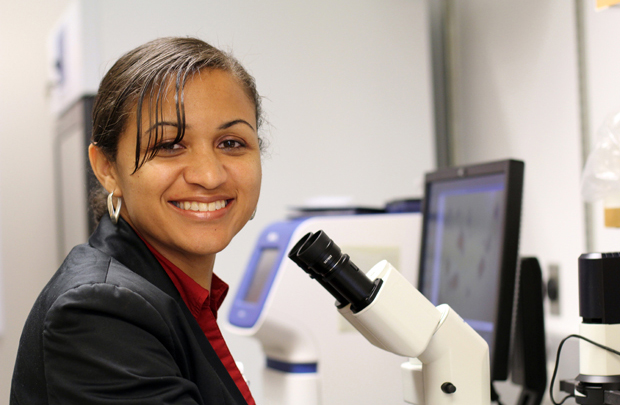For Senta Georgia, PhD, stem cell research offers a window into much more than the biology of pancreatic cells and diabetes.
“Molecular biology is elegant,” said Georgia, principal investigator at the Saban Research Institute of Children’s Hospital Los Angeles (CHLA) and assistant professor at the Keck School of Medicine of USC. “And what really moves me is that it’s simple, and it’s the underpinnings of how life actually works. It’s almost a spiritual insight into how life is put together, how it works.”
Georgia always wanted to be a scientist — although her initial interests were much bigger than molecules. As the eldest of three children growing up in the army town of Pemberton, New Jersey, she dreamt of becoming a paleontologist and remembers building a papier-mâché dinosaur with her mother. Her aspirations shifted to archeology after she learned about ancient Egypt. By sixth grade, whales and marine biology captured her imagination, but she “couldn’t put that into a broader social context for curing disease or helping people,” she said. “I also figured out that I’m deathly afraid of the idea of jumping into the ocean!”
She discovered genetics when her ninth-grade class took a field trip to a company that was developing sequencing technology to advance the human genome project, and this inspired her interest in molecular biology. She majored in biological sciences and minor in ethics in society at Stanford University.
After graduation, she worked as a research technician in the lab of Anil Bhushan, PhD, who was studying pancreatic development at CHLA. She also worked with Bhushan as a PhD student and eventually followed him to UCLA. She completed her dissertation about the differentiation, self-renewal and regeneration of beta cells — pancreatic cells that produce, store and release insulin, which lowers blood sugar concentrations.
She accepted a postdoctoral fellowship and assistant adjunct professorship at UCLA’s Larry L. Hillblom Islet Research Center. Over time, she became increasingly interested in questions of how undifferentiated cells become and remain beta cells.
Beta cells don’t replicate easily: current estimates are that they last between five and 20 years. This fact drove Georgia’s curiosity about intestinal stem cells, which continuously replace themselves. She received a Mentored Research Scientist Development Award (K01) from the National Institutes of Health (NIH) and studied endocrine cell differentiation in the intestines with UCLA’s Martín Martín, MD.
Her study inspired the project that currently occupies her lab at Children’s Hospital Los Angeles: trying to induce intestinal stem cells to make insulin. The ultimate objective is to use these cells to treat both Type 1 and Type 2 diabetes.
“We are interested in helping people,” said Georgia, “and so that means a lot.”
—Cristy Lytal


